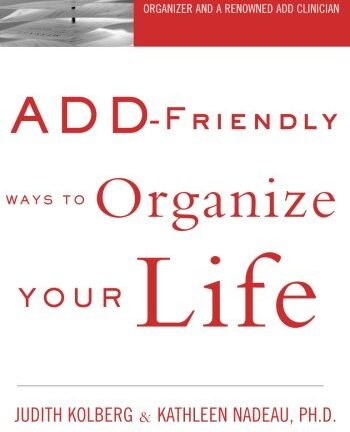The expectation is no longer to simply ‘sit still and listen.’ It is to ‘take charge of your life.’ Taking charge requires learning to organize.
This idea is as painful to most ADHD adults as it is familiar. We embark on a new organizing plan with the best of intentions, only to watch everything disintegrate when the novelty fades. The effects are embarrassing at best, devastating at worst.
In ADD-Friendly Ways to Organize Your Life, authors Judith Kolberg and Kathleen Nadeau provide insight into the ADHD tendencies that make sticking with an organizing system so difficult and suggest that — yes, you’re reading this correctly — we work with those tendencies.
Rather than telling us to fight our brain chemistry, the authors outline a comprehensive strategy that uses our ADHD traits to further our organizing efforts. When that’s not possible, they provide guidance on working with friends and family to get much-needed support.
One of the authors’ most valuable points is that we must “make the race short, so [we’ll] be able to cross the finish line without stopping.” Structuring your life as a series of sprints, not a marathon, will facilitate successes, lower your anxiety level, and increase your executive functioning capacity.
Kolberg and Nadeau also help ADHD adults identify which elements of an organizational system feel uncomfortable. For example, my husband will not put anything away in cabinets or drawers. He is, as Kolberg and Nadeau put it, an “out of sight, out of mind person.” After I helped him set up a few organizing systems using baskets, not drawers, he began putting his things away regularly.
Understanding the uncomfortable or negative feelings around a task is often the key to successful organizing. As you’ve probably learned the hard way, a system must “feel right” in order to work.
A word of warning: the anecdotal stories in ADD-Friendly Ways to Organize Your Life paint a pretty uniformly rosy picture. Readers will quickly learn the plot formula: ADHD adult’s life was a mess, ADHD adult got help and created a system that worked, and now ADHD adult is enjoying a high level of success. With all the acknowledgement of how easily organizing systems can fail for ADHD adults, a few anecdotes about overcoming setbacks and getting back on track would have helped readers struggling with a history of demoralizing failures.
I was also disappointed to see the authors recommend that readers not attempt some strategies without a professional organizer. Given the level of difficulty ADHD adults often experience managing money, those strategies will be out of reach for many readers.
At the same time, I very much appreciated the authors’ cursory treatment of stimulant medication. While medication is certainly helpful — and often necessary to form ADHD-friendly systems and habits — it is there to support good systems, not do the work for you.
Kolberg and Nadeau offer many such good systems, and if you’ve had little success taking charge of your life — especially if the phrase “organizing strategies” makes you cringe — this book is well worth a read.
Hey there! Are you enjoying The ADHD Homestead?
Here's the thing: I don't like ads. I don't want to sell your attention to an advertising service run by the world's biggest data mining company. I also value my integrity and my readers' trust above all, which means I accept very few sponsorships/partnerships.
So I'm asking for your support directly. For the cost of one cup of coffee, you can help keep this site unbiased and ad-free.
Below you will find two buttons. The first lets you join our crew of Patreon pals and pledge monthly support for my work. Patrons also have access to my Audioblogs podcast. The second takes you to a simple donation page to pledge one-time or recurring support for The ADHD Homestead, no frills, no strings. Do whichever feels best for you!


